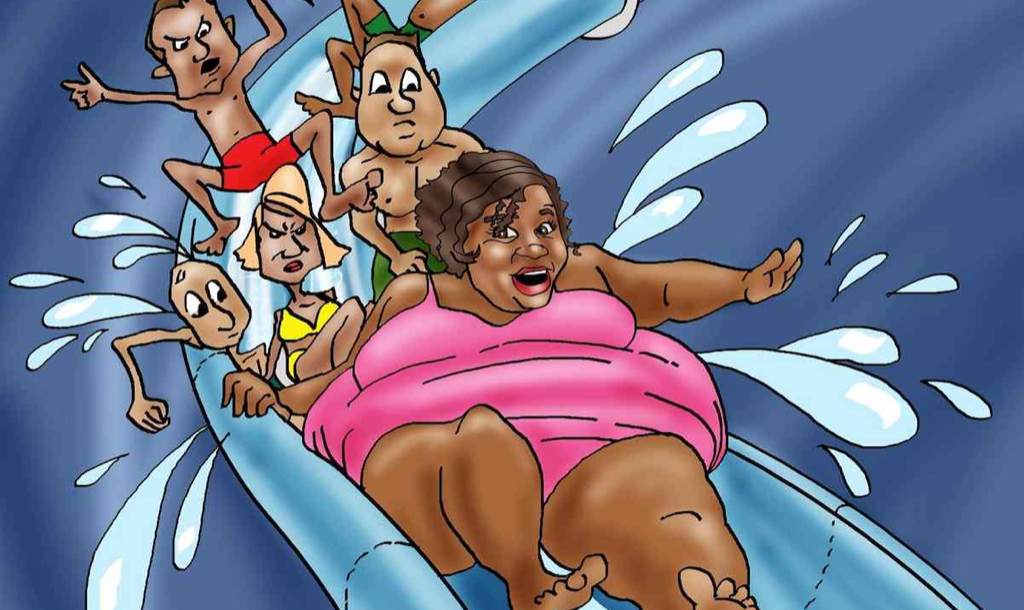I stare at myself in the full-length mirror. “Fat may be what I am, but not who I am,” I say. It doesn’t work.
There is nothing more terrifying for a fat person than to look into a full-length mirror. Multiple times a day, I traverse the Walk of Shame—also known as the hallway in my home—where at the far end the tormentor hangs. My dearest Pa noticed I didn’t have a proper mirror and kindly gave me a full-length one he had lying about. He even came around with the picture hooks and hammer to hang it. What could I do-refuse his well-meaning gift? Until then, I mercifully had just a small face mirror in the bathroom, which allowed me to avoid viewing parts of me I prefer to keep out of sight.
Most days, I make the Walk of Shame with eyes lowered, but try as I may to NOT to look, sometimes I just can’t help myself—like now. I am a sucker for self-torment.
“Being fat doesn’t define me. It’s simply extra baggage which I carry and I won’t carry it forever,” I tell the bloated image, trying to sound convincing but I’m not so sure. I know all too well the hard work which goes into “losing” extra baggage. And not just a few pieces of luggage—it’s a cargo load.
The tormentor reveals all. A huge flabby apron hangs around my mid section. Thunder thighs with Jell-O cellulite glisten and wink in the sun. More gelatinous mass hangs under my arms, which wobbles and rolls and juts out whenever my arms are flush against my body. It’s a hard task to not get lost in the disgust of it all. I mean, who wants to look at my fat ugly rolls and love handles? Ironic name, since nobody actually loves them.
But I do have amazing eyes and a great smile, complete with two cheeky dimples. I inherited my best physical features from both parents: my late Polynesian mother’s caramel-latte skin, high cheekbones, perfectly oval face and full, pouty lips; and my Pa’s glittering emerald-shaped eyes and unruly curly hair.
“I am a strong, beautiful, confident woman, mother and friend. My weight does not enslave me,†I pronounce to the woman in the mirror. “Hello, who am I kidding?” I sigh, shoulders slumped. My weight rears its ugly, embarrassing head all the time. To say it doesn’t enslave me is highly optimistic at best, a lie at worst. It has been the bane of my existence for most of my 30 years. I stop short at saying affirmations are a waste of time, but some days it’s easier to believe them than others. Today is not one of those days.
Defeated, I resumed my usual activity of picking up after my two darling but messy preschoolers. With eyes cast down, I work while trying to avoid the hippopotamus at the end of the hallway. Even still, I nearly trip over an open photo album lying in the doorway to the kids’ room. Fi loved to look through the albums. This one contained pictures from university through Fi’s birth.University. Back when I was only a few pounds overweight. Back when Tiresa and I were inseparable. The album page was open to a shot of the three of us on the day Mika won the Student Body President election. We stood with arms around each others’ shoulders, wide grins on our faces, a banner behind us emblazoned with, “Mika for Prez.”
That was only three weeks after we first met Mika.
“Ko-mo my tang guh,” I repeat after Tiresa, who nearly explodes in a fit of silent giggles. We are in the library. I’m supposed to be helping her write a persuasive essay for English Comp, but she’s having too much fun teaching me Samoan insults. Insults I never learned while growing up with a white father of Scottish descent while Tiresa grew up with our maternal Samoan grandmother and extended island family.
“What did I just say?” I whisper, trying hard not to giggle because Tiresa is giggling.
“You said, ‘dumb bi—'” she wheezes but can’t finish the sentence. Tears squeeze out her eyes.
I gasp. “And you said that to your teacher’s face?” Tiresa grew up with much more boldness than I did. The worst thing I ever did in class was chew gum. Once.
Tiresa nods. “It’s not like she knew what I was saying—until she called Mama Rose and repeated it to her. Mama Rose was on her side until Mrs. Hammond blamed my, “island upbringing” for my attitude.” She spoke so loudly, you could hear her through the phone. You should have seen Mama Rose turn red. Aunt Flo actually ran out of the room.”
“What happened after that?” I prod. Her Samoan heritage was Mama Rose’s pride. You did not joke about it, let alone outright insult it.
Tiresa’s eyes sparkle. “Mama Rose called her a muli lapo’a and hung up on her.”
“Moo-lee lah-poh-uh,” I repeat. “Which means?”
“Fat ass!” Tiresa whispers and we collapse in another fit of giggles.
When I recover, I gasp, “And I thought Pa was bad!”
Tiresa looks at me, puzzled. “I don’t remember Pa ever saying anything bad or swearing. He was always so sweet.”
“He has quite the temper when provoked” I nod. “Once, he got so mad at a man that he threatened to shove bagpipes up the man’s backside so that you’d hear Scotland the Brave playing whenever he had flatulence.”
Tiresa politely chuckles but I could tell she isn’t really amused. I feel sheepish for mentioning Pa. Pa was the only father Tiresa had ever known. After our separation, Tiresa only saw him on the few visits I made to Mama Rose during summers and on holidays. She usually seems angry when I mention Pa, like he abandoned her, not that she was taken from him.
“Tiresa,” I place my hand over hers, “Pa would have adopted you, but after Ma died, he didn’t have any parental rights to you. The family wanted to take me away, too, but Pa wouldn’t let them.”

